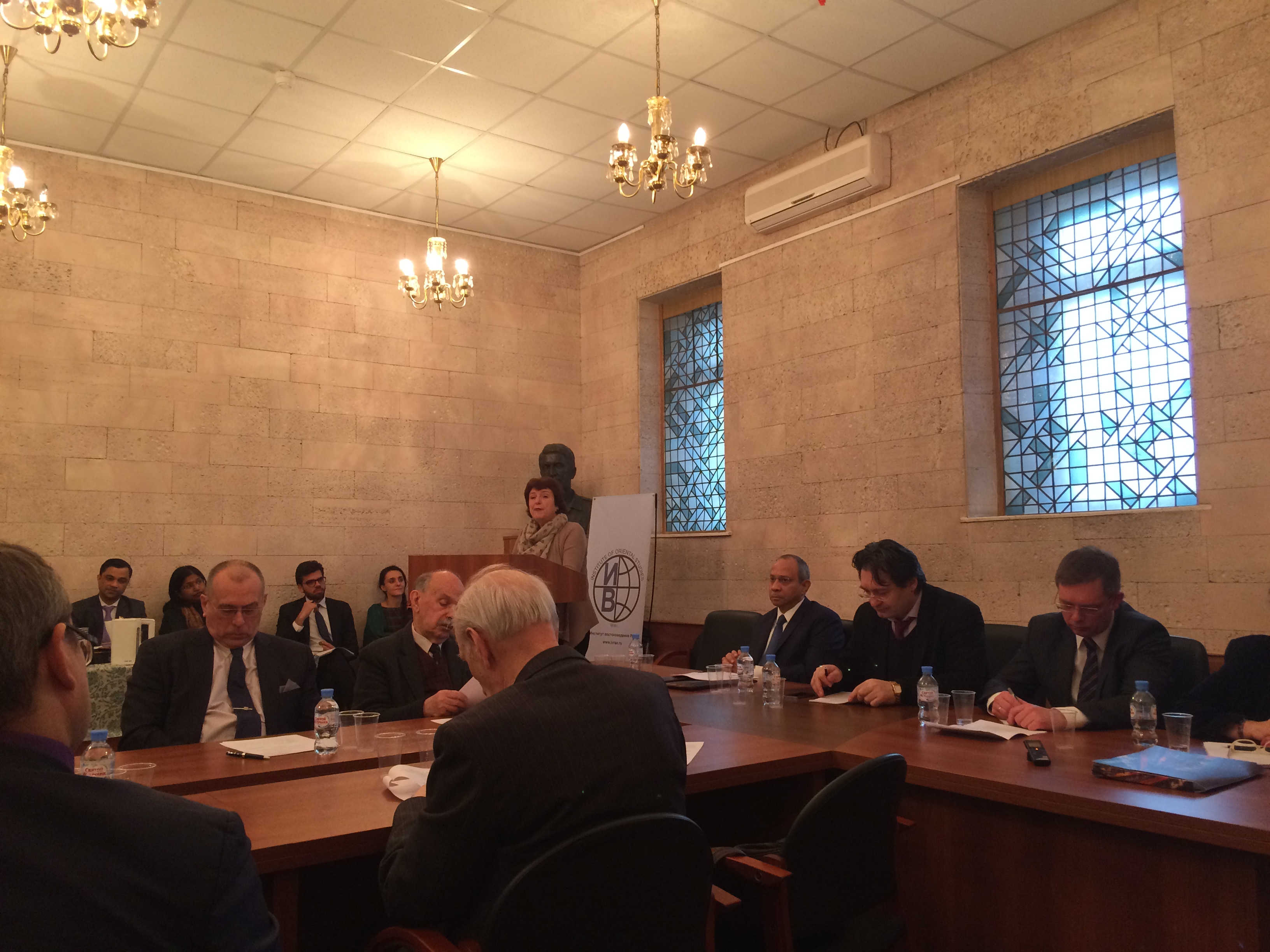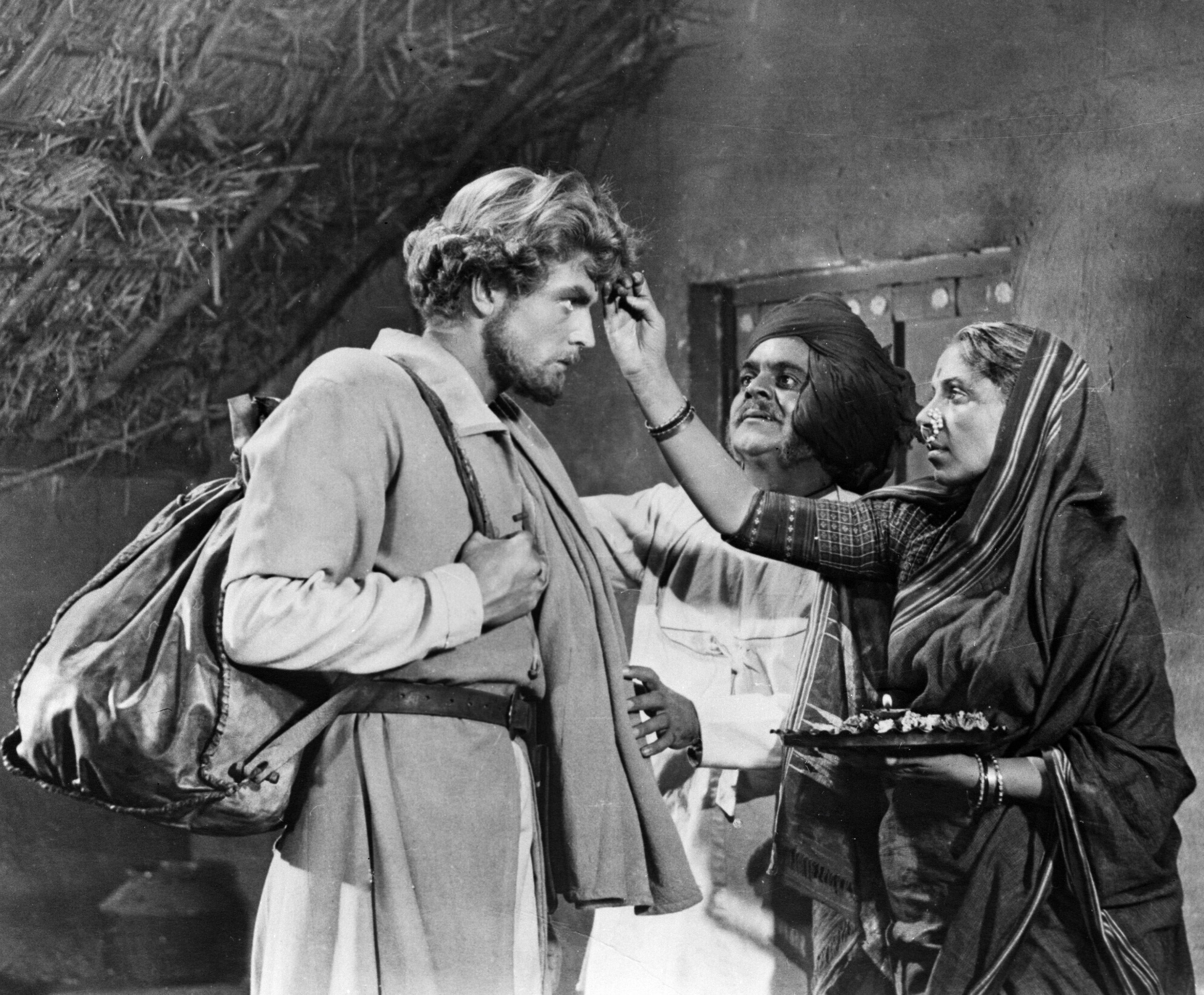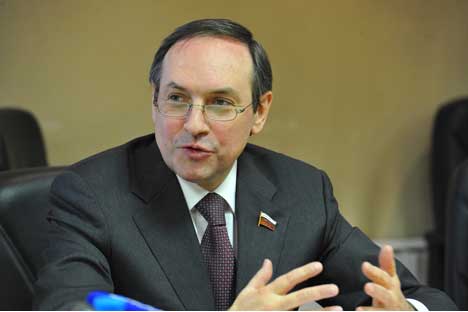Moscow hosts academic conference on Russia-India relations

The conference was one of the first events to mark the 70th anniversary of the establishment of diplomatic ties between Russia and India. Source: Ksenia Zubacheva
Although the 70th anniversary of the establishment of diplomatic ties between Russia and India officially falls on Apr. 13, 2017, the countries have already begun to celebrate this important occasion.
On Feb. 20 representatives of the Russian expert community met for a conference in Moscow that was organized by the Indian Embassy and the Institute of Oriental Studies of the Russian Academy of Sciences (RAS). The participants discussed the history of the Russia-India partnership and offered their views on how to move the relationship forward.
The conference also saw the presence of Indian Ambassador to Russia Pankaj Saran, who said he was ready to listen “as much as possible” to the participants and attempt “to serve as a bridge between academic communities in Russia and India.”
According to the ambassador, the embassy will host many events in different parts of Russia this year with the aim of bringing together as many stakeholders in the Indo-Russian relationship as possible.
He announced that on the day of the anniversary, Apr. 13, Moscow would witness a gala concert. A similar concert would be held in St. Petersburg on Apr. 17, Saran added.
Ambassador Saran also assured the participants of the conference that the embassy would do everything possible to support Indology. “We need to sit down and think how the relationship between Russia and India will look like in the next 20 years,” he said. “There is no doubt our relationship will be significant not only for the development of the Asia-Pacific region, but also for developments in world politics.”
Remembering the past and assessing the future
The initial years after the establishment of diplomatic ties were full of events and interesting personalities, who ensured the relationship would move in a positive direction. According to Tatiana Shaumyan, head of the Centre of Indian studies at the Institute of Oriental Studies (RAS), the relationship between the countries was dependent on the personalities of their leaders. While Prime Minister Jawaharlal Nehru determined India's position towards the USSR, Joseph Stalin defined the Soviet policy towards New Delhi. The Soviet leader had his own opinion about national liberation movements worldwide, and in India in particular.
In the 1950s Russians knew almost nothing about their Indian partners. The first Soviet Ambassador to India Kirill Novikov (1947-1953) stated in his first report to Moscow that the primary aim in the USSR’s activity in India was to study India, with its political system, culture, traditions, resources and economic potential. Before that, everything that Russians knew about India came from visiting Indian communists.
Both countries have come a long way since that time. The Soviet Union no longer exists and India has worked hard to become one of the fastest growing economies of the world. Today, the key challenge for Moscow and New Delhi is to understand how to use the vast experience they have in working with each other and find areas where the countries could benefit from close cooperation, said Felix Yurlov, a professor at the Institute of Oriental Studies. “The relationship between our countries should only be addressed taking the global agenda into account,” he said.
With India and Pakistan joining the Shanghai Cooperation Organization (SCO) in June this year, new opportunities are opening for the resolution of regional conflicts.
Gennady Chufrin, Member of the Governing Board of the Institute of World Economy and International Relations (IMEMO) at RAS, noted that this trend might facilitate conflict resolution in Afghanistan.
“Countries will not be able to resolve this crisis separately, but joining efforts, especially with India and Pakistan entering the SCO, might increase this possibility,” he said.
He noted, though, that bilateral territorial disputes such as Kashmir would not be addressed at the SCO. This is a matter that India will not allow to be raised in a regional organization.
Lobbying a way out
In 2010 during the visit of Russian then-President Dmitry Medvedev to India, the countries set a goal of boosting their trade turnover to the volume of $20 billion by 2015. This goal was not reached. In 2015 the total overall turnover barely reached $6.7 billion.
Gleb Ivashentsov, former Russian ambassador to South Korea and now member of the Russian International Affairs Council, sees the following reasons for this.
First and foremost, this is due to the Soviet legacy. Russian companies are used to working with the public sector while the Indian private sector has been long working with the West. Few Indian private sector players see opportunities in working with their Russian counterparts, he said.
Second, Russian businesses do not know about the array of opportunities present in the Indian market. In contrast to big industrial exhibitions of India that happened in the Soviet Union, today there is virtually nothing. The few that take place now display just traditional clothes and accessories.
In addition, according to Ivashentsov, Russian businesses do not know what to offer to Indian partners. There is no efficient and timesaving transport route that facilitates quick transit of goods.
Sergey Lunev, a professor at the Moscow State Institute of International Relations (MGIMO University), echoes this view. He agreed that transport is a crucial factor that could change the trade situation for the better. As he sees it, despite all the talk about Russia’s pivot to the East, it has not happened yet in reality.
“In fact, the political elite in both Russia and India is still too oriented towards the West. Indian policymakers have relatives in the U.S. and send their children to study there, while Russian decision-makers falsely believe that Europe will cease to be a U.S. vassal and would once again partner with Russia,” Lunev said.
In addition, there is limited information about Russia in India and vice versa. There are few Russian journalists working in India.
The absence of pro-Russian and pro-Indian lobbying in the respective countries does not help this situation, Lunev added.
If the governments fail to address this issue and establish good lobbying practices for Indian businesses in Russia and Russian companies in India, the economic side of the relationship is bound to stay in a depressing state, according to Lunev.
Editor’s Note: This article was updated on Feb. 24,2017 to correct the statement attributed to Tatiana Shaumyan.
If using any of Russia Beyond's content, partly or in full, always provide an active hyperlink to the original material.
Subscribe
to our newsletter!
Get the week's best stories straight to your inbox

